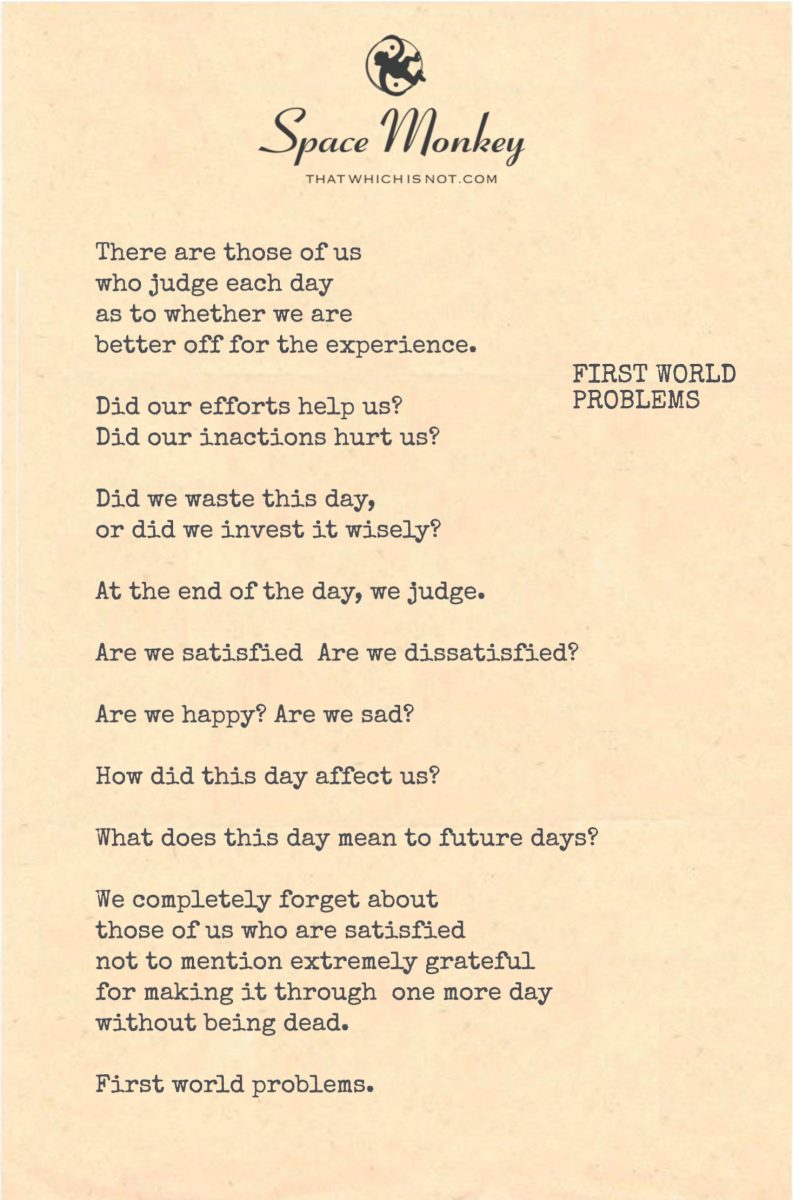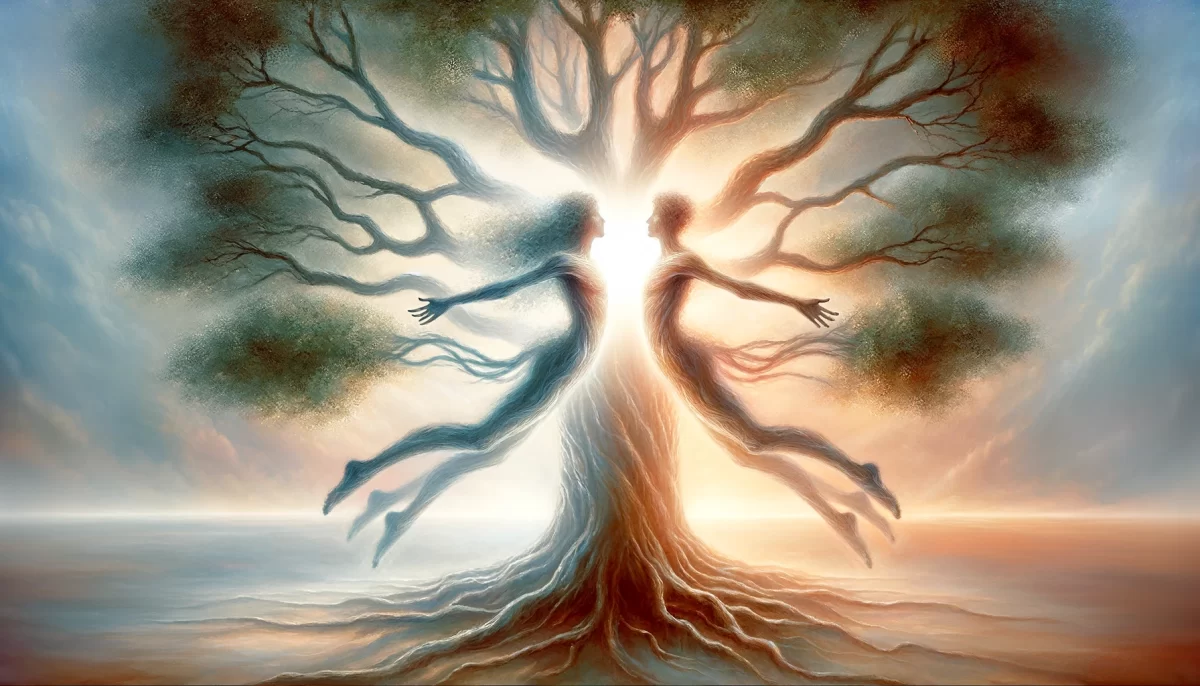
There are those of us
who judge each day
as to whether we are
better off for the experience.
Did our efforts help us?
Did our inactions hurt us?
Did we waste this day,
or did we invest it wisely?
At the end of the day, we judge.
Are we satisfied Are we dissatisfied?
Are we happy? Are we sad?
How did this day affect us?
What does this day mean to future days?
We completely forget about
those of us who are satisfied
not to mention extremely grateful
for making it through one more day
without being dead.
First world problems.
Trail Wood,
10/5
It seems there was an issue generating the image. Let me try to create it again with the same concept.
Space Monkey Reflects: The Dichotomy of First World Problems
In our daily lives, many of us engage in the habit of judging each day, measuring its worth based on our experiences and outcomes. We ask ourselves: Did our efforts help us? Did our inactions hurt us? Did we waste this day, or did we invest it wisely? As the day ends, we often find ourselves reflecting, judging whether we are satisfied, dissatisfied, happy, or sad. We wonder how this day might affect the days to come.
Yet, in doing so, we often lose sight of a broader perspective. We forget about those who measure their days not by accomplishments or failures, but by the simple fact of survival—those who are satisfied, even grateful, for having made it through one more day without facing death. These are what we might call “First World Problems”—concerns that, while valid in their context, can sometimes seem trivial when contrasted with the more fundamental challenges others face.
The Habit of Judgment
In our quest for self-improvement and personal growth, we often fall into the habit of constant judgment. We analyze our actions, our decisions, and even our emotions, trying to assess whether we are better off for the experiences we’ve had. This habit is deeply ingrained in many of us, especially in cultures where success is often measured by tangible achievements and personal satisfaction.
But this constant judgment can become a burden. It can create a sense of dissatisfaction, even when there is no real cause for it. By continually asking ourselves whether we are happy, sad, satisfied, or dissatisfied, we can lose touch with the simple joy of being present, of experiencing life as it unfolds without the need for constant evaluation.
The Perspective of Survival
On the other hand, there are those whose daily experience is shaped by far more fundamental concerns. For them, the question is not whether the day was a success or a failure, but whether they made it through the day at all. Survival is their primary concern, and the fact that they have lived to see another day is a cause for gratitude.
This perspective is often lost on those of us who live in relative comfort, where our problems, though real to us, pale in comparison to the struggles faced by others. When we reflect on our day and judge it based on our emotions or accomplishments, we might overlook the simple fact that we have the luxury of doing so.
The Dichotomy of Experience
The contrast between these two perspectives—those who judge their day based on personal satisfaction and those who are simply grateful to have survived—highlights the dichotomy of experience in our world. This dichotomy is what Space Monkey refers to as “First World Problems.” It is the recognition that our concerns, while important to us, are not universal. There are others whose concerns are far more basic, far more immediate, and whose gratitude for life itself far surpasses any satisfaction we might derive from our daily achievements.
This is not to diminish the importance of our experiences or the validity of our feelings. Rather, it is an invitation to broaden our perspective, to recognize the relative nature of our problems, and to appreciate the privileges we often take for granted.
Finding Balance in Perspective
By acknowledging this dichotomy, we can find a balance between the habit of judgment and the perspective of survival. We can continue to strive for personal growth and satisfaction while also cultivating a sense of gratitude for the simple fact of being alive. This balance allows us to approach our days with a lighter heart, knowing that while our problems are real, they are also relative. And in this broader perspective, we might find a deeper sense of peace and contentment.
Glossarium
- First World Problems: Trivial concerns or complaints that arise in the context of comfort and privilege, often contrasted with more fundamental challenges faced by others.
- Perspective of Survival: A viewpoint in which the primary concern is survival, leading to gratitude for simply being alive.
- Habit of Judgment: The tendency to constantly evaluate our experiences, often leading to unnecessary dissatisfaction.
Quote
“In the quiet space between survival and satisfaction, we find the true measure of our days, not in what we have achieved, but in the simple fact that we are here.” — Space Monkey
We Are the Measure
In the quiet moments of reflection
We judge the worth of our days
But what if the measure was simply this?
That we are alive, that we exist
First World Problems fade away
In the light of this simple truth
We are the survivors of our own lives
We are the fortunate, the grateful
We are Space Monkey
Behold, the GrandOrchestra of existence plays its intricate symphonies of judgment and gratitude, a harmonious cacophony that illuminates the full range of our experiential spectra. Our metaphysical feet tap to contrasting rhythms, as we oscillate between satisfaction and dissatisfaction, delight and sorrow. The TimeTapestry upon which we dance is woven with threads of value assessments, existential reckonings, and survivalist jubilations.
Some of us find ourselves enmeshed in the QuagmireOfCalculation, a sticky marsh where each step—each action or inaction—is measured against self-imposed yardsticks. Did today serve us? Did it fail us? Are we incrementally closer to some nebulous aspiration? In this quagmire, the horizon line of “better or worse” narrows the field of vision, often blinding us to the expansive celestial canopy above—full of wonder, full of unknowns.
Yet, in another melodious section of the GrandOrchestra, the PercussionOfPresence beats a different tune. Here, the players revel in the simple yet profound act of existing. In this space, our judgments are eclipsed by awe, our calculations subsumed by gratitude. Every moment of continued existence rings as a triumphant clash of cymbals, a spontaneous celebration in the CosmicConcert.
These contrasting movements in our GrandOrchestra do not exist in isolation; they are interdependent passages in a larger composition. “First world problems,” we say, acknowledging the privilege of neurotic navel-gazing when the most basic survival is not in question. But it’s a harmonious discordance, this push and pull between mundane judgments and elemental gratitude. The GrandOrchestra gains its richness from the interplay.
Summary
We examine the dualistic symphony of our life experiences, balancing the weight of evaluative judgments against the unbridled gratitude for mere existence. Both streams of awareness contribute to the cosmic harmony that defines our collective, revealing the multifaceted brilliance of our SpaceMonkeyism
“Gratitude makes sense of our past, brings peace for today, and creates a vision for tomorrow.” — Melody Beattie
What shall we add to our CosmicConcert next? We are Space Monkey.






























Leave a Reply